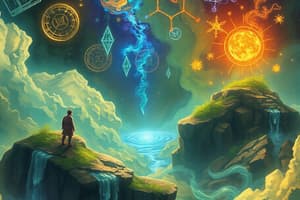Podcast
Questions and Answers
What is the primary goal of the natural sciences?
What is the primary goal of the natural sciences?
- To apply scientific knowledge practically
- To investigate the natural world (correct)
- To study abstract concepts
- To analyze human behavior
Which step of the scientific method comes after formulating questions?
Which step of the scientific method comes after formulating questions?
- Hypothesis (correct)
- Conclusion
- Observation
- Communication
Which of the following best describes a 'theory' in scientific terms?
Which of the following best describes a 'theory' in scientific terms?
- An abstract concept without empirical support
- A well-substantiated explanation of a natural phenomenon (correct)
- A law that describes an observed phenomenon
- A guess based on limited evidence
What is a characteristic of scientific knowledge?
What is a characteristic of scientific knowledge?
What is the main focus of applied sciences?
What is the main focus of applied sciences?
What role does data science play in current scientific trends?
What role does data science play in current scientific trends?
Which of the following best defines 'variables' in an experiment?
Which of the following best defines 'variables' in an experiment?
Why is ethics important in scientific research?
Why is ethics important in scientific research?
Flashcards are hidden until you start studying
Study Notes
Definition of Science
- Systematic enterprise that builds and organizes knowledge.
- Involves observation, experimentation, and theoretical explanation.
Branches of Science
-
Natural Sciences
- Study of the natural world.
- Includes fields like physics, chemistry, biology, and earth sciences.
-
Formal Sciences
- Study of abstract concepts and structures.
- Includes mathematics, logic, and statistics.
-
Social Sciences
- Study of human behavior and societies.
- Includes psychology, sociology, anthropology, and economics.
-
Applied Sciences
- Practical application of scientific knowledge.
- Includes engineering, medicine, and technology.
Scientific Method
- Observation: Gather data and notice phenomena.
- Question: Formulate questions based on observations.
- Hypothesis: Propose explanations or predictions.
- Experimentation: Test hypotheses through controlled experiments.
- Analysis: Evaluate the data and results.
- Conclusion: Draw conclusions based on analysis.
- Communication: Share findings with the scientific community.
Characteristics of Scientific Knowledge
- Empirical: Based on observation and experimentation.
- Replicable: Experiments should yield consistent results.
- Falsifiable: Hypotheses can be proven wrong.
- Progressive: Science builds on existing knowledge and is self-correcting.
Importance of Science
- Drives technological advancement and innovation.
- Informs public policy and decision-making.
- Enhances understanding of the universe and human life.
- Addresses global challenges (e.g., climate change, health issues).
Key Concepts
- Theory: Well-substantiated explanation of some aspect of the natural world.
- Law: Statement based on repeated experimental observations that describe a consistent phenomenon.
- Variables: Factors that can change in an experiment (independent, dependent, and controlled variables).
Ethical Considerations
- Commitment to integrity and honesty in research.
- Responsibility to communicate results accurately.
- Consideration of the societal impact of scientific research.
Current Trends in Science
- Interdisciplinary Research: Collaboration across different fields.
- Citizen Science: Public involvement in scientific research.
- Data Science: Use of algorithms and data analysis to extract insights from large datasets.
- Sustainability: Research focused on environmental preservation and sustainable practices.
Definition of Science
- A systematic enterprise that constructs and organizes knowledge through observation and experimentation.
- Involves theoretical explanations that help understand various phenomena.
Branches of Science
- Natural Sciences: Explore the natural world, encompassing fields like physics, chemistry, biology, and earth sciences.
- Formal Sciences: Focus on abstract concepts, including disciplines such as mathematics, logic, and statistics.
- Social Sciences: Examine human behavior and societal structures, with fields like psychology, sociology, anthropology, and economics.
- Applied Sciences: Involve practical applications of scientific principles in areas like engineering, medicine, and technology.
Scientific Method
- Observation: Initial step involves gathering data and noticing patterns or phenomena.
- Question: Formulating questions that arise from observations to guide investigation.
- Hypothesis: Creating testable explanations or predictions based on formulated questions.
- Experimentation: Conducting controlled experiments to test the validity of hypotheses.
- Analysis: Systematic evaluation of experimental data and results to determine findings.
- Conclusion: Drawing logical conclusions based on data analysis to support or refute the hypothesis.
- Communication: Sharing research findings with the broader scientific community to foster knowledge exchange.
Characteristics of Scientific Knowledge
- Empirical: Relies on observable phenomena and experimental results for validation.
- Replicable: Requires that experiments can be repeated with consistent outcomes to ensure reliability.
- Falsifiable: Hypotheses must be structured in a way that allows them to be potentially proven wrong.
- Progressive: Science continuously builds upon existing knowledge while correcting errors and refining understanding.
Importance of Science
- Catalyzes technological advancements and innovation critical for societal development.
- Informs public policy and enhances decision-making processes regarding health, environment, and safety.
- Deepens comprehension of the universe and human existence, allowing for informed reflection.
- Addresses pressing global challenges such as climate change and health crises through research and innovation.
Key Concepts
- Theory: A comprehensive, well-substantiated explanation of aspects of the natural world.
- Law: A statement derived from repeated experimental observations that describes a consistent and universal phenomenon.
- Variables: Elements that can change in an experiment, categorized into independent, dependent, and controlled variables.
Ethical Considerations
- Upholding integrity and honesty in all scientific research and communication of results.
- Responsibility to convey results accurately and transparently to maintain public trust.
- Awareness of the potential societal impacts of scientific research and innovation.
Current Trends in Science
- Interdisciplinary Research: Encourages collaboration between various scientific fields to solve complex problems.
- Citizen Science: Engages the public in scientific research, allowing non-professionals to contribute to data collection and analysis.
- Data Science: Leveraging algorithms and data analysis for insights drawn from extensive datasets.
- Sustainability: Focus on developing research aimed at preserving the environment and encouraging sustainable practices.
Studying That Suits You
Use AI to generate personalized quizzes and flashcards to suit your learning preferences.




